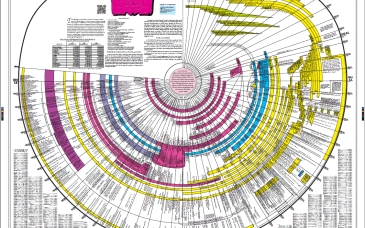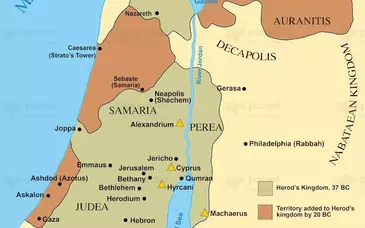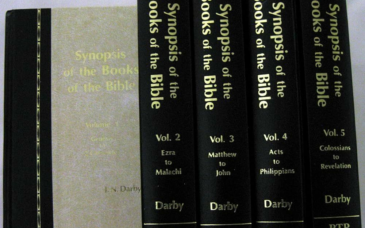
Included here are articles that deal with aspects of specific New Testament Books or passages, but does not include Lectionary Commentary articles. For more general articles on the New Testament, see Bible Topics, Issues in Biblical Interpretation, Biblical Theology, The Bible in the Church, and Historical and Cultural Context of Scripture. See also the Text Index for commentary, sermons, and articles on specific passages, as well as Bible Short Topics for brief articles on various aspects of the New Testament.
These are short articles providing summary information on the books of the Old and New Testaments. Some of these are only content outlines, while others give brief information about the biblical books. In some cases, there will be links to more detailed articles and information.
The Gospels
The Shape of the Gospel Story: The Synoptic Gospels
A summary of the basic narrative story line of the Synoptic Gospels, noting similarities and differences in how each tells the story.
The Gospels and the Synoptic Problem
An analysis of the literary relationship of the first three Gospels in terms of both shared material as well as material unique to each; surveys the various source theories and includes observations on the nature of the Gospels.
A brief survey of the process by which the New Testament Gospels were compiled and written. (Excerpt from The Gospels and the Synoptic Problem)
A Proposed Reconstruction of the "Q" Document
A chart showing one possible reconstruction of the hypothetical collection of the sayings of Jesus called "Q" that some have proposed as one of the sources used by the Gospel writers in composing the Synoptic Gospels.
Kingdom Priorities: Verse Commentary on Matthew 6:19-34
Verse by verse commentary and Bible study on Matthew 6:19-34, Jesus' teaching in the Sermon on the Mount about the priorities of the Kingdom.
Kingdom Forgiveness; Verse Commentary on Matthew 18:21-35
Verse by verse commentary on Matthew 18:21-35, Jesus' teaching on the nature of forgiveness.
A series of 23 Bible study lessons on the Gospel of Matthew.
The Keys to the Kingdom: Binding and Loosing, and Biblical Interpretation
A concise contextual analysis of the church's responsibility to 'bind' and 'loose' related to modern ethical application of biblical principles within a Community of Faith.
To the Ends of the Earth: Proclamation and the Second Coming
Short essay dealing with the misperception that every person must hear the Gospel before the Second Coming of Jesus can occur (Matt 24:14, Mark 13:10).
Word of Faith and Commanding: Contextual Analysis of Matthew 21:21
A contextual analysis of Matthew 21:21 in terms of the common "word of faith" or "commanding in Jesus name" interpretation.
Extraordinary News: Verse Commentary on Luke 2:8-20
A verse by verse commentary and Bible study on Luke 2:8-20, the birth of Jesus and the visit of the Shepherds.
Good News From Israel: Verse Commentary on Luke 2:21-35
Verse by verse commentary and Bible study on Luke 2:21-35, the presentation of the infant Jesus in the Temple and the blessing of Simeon.
Information on the Gnostic Gospel of Thomas, and its relationship to the canonical Gospels of the New Testament; includes both Coptic and Greek versions in a chart with Gospel parallels.
A brief article dealing with the differences in chronology of the events surrounding the crucifixion of Jesus, especially the differences between Mark and John.
A brief article explaining the contextual meaning of the I AM sayings in John's Gospel, especially in John 8:58.
A series of 22 Bible study lessons on the Gospel of John to be used in small groups or for personal devotions, study, and reflection.
The Epistles
New Testament Letters and Epistles
Summary of the genre and form (structure) of New Testament letters and epistles, and the implications for interpretation.
Voice Bible Study: 1 Corinthians
A series of 15 Bible study lessons on the Epistle of First Corinthians to be used in small groups or for personal devotions, study, and reflection.
Unequally Yoked: A Study in Context (2 Cor 6:14-18)
A contextual and theological examination of Paul's advice to the Corinthians, "do not be unequally yoked with unbelievers," showing its background in the Old Testament concept of order and boundaries and applied by Paul ethically.
The Poured-Out Life: The Kenosis Hymn in Context (Philippians)
A contextual analysis of Philippians 2:5-11, known as the Kenosis passage, concluding that the main theme of the passage is an appeal to unity and servanthood based on heavenly citizenship.
The "Third Heaven" (2 Cor 12:2)
Brief explanation from a first century cultural context of the meaning of "the third heaven" in 2 Corinthians 12:2.
The Role of the Law in Galatians 3:19-25
An analysis of the role of the law in Galatians 3:19-25, rejecting the "salvation by works" debate and showing that Paul's intent was to defend the Gospel for Gentiles.
Brief comments on 2 Timothy 3:16, concluding that this passage cannot support traditional proof texts about inspiration and the independence of the Bible.
A series of 15 Bible study lessons on the Book of Hebrews to be used in small groups or for personal devotions, study, and reflection.
James and the Law: Ethics in the Christian Life
Examines the assumed tension between Paul and James on the law; concludes that they are addressing different issues with the supposed tension arising from the Reformers projecting their own context into the text.
An outline and brief notes on the literary structure of The Epistle of First Peter.
A series of 5 Bible study lessons on the Epistle of First Peter to be used in small groups or for personal devotions, study, and reflection.
The Revelation
Interpreting the Book of Revelation
An introduction to the Book of Revelation, including issues in interpretation, ways to understand the time frame of the book, and an outline.





